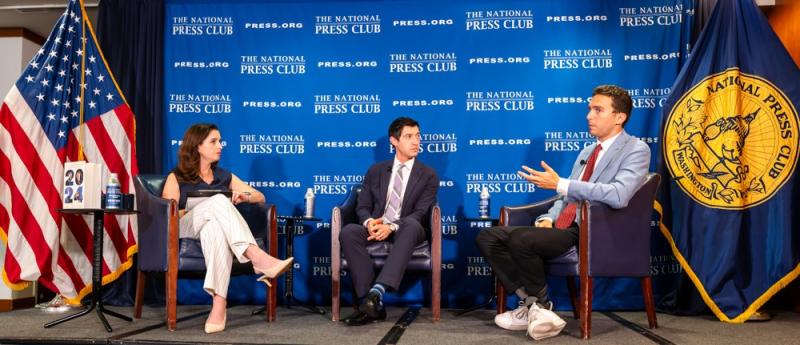Reporters recount how their access to presidential candidates' campaigns shaped book about 2024 election

“Our goal was to make this the definitive and most comprehensive book about the 2024 election,” New York Times White House correspondent Tyler Pager told a National Press Club crowd at a July 22 Headliners Book Event. Appearing with one of his co-authors, White House reporter Isaac Arnsdorf of The Washington Post, the two together made the case that they'd accomplished their goal with the 400-page “2024: How Trump Retook the White House and the Democrats Lost America.”
Hundreds of interviews are chronicled as a multitude of inside stories and accounts from the presidential campaign trail take readers through 24 chapters on Comebacks, the Rematch, and the Shakeup. “2024” is the story of the election that tested American democracy and reshaped the world.
The authors said their beats gave them extraordinary access to President Donald Trump and his advisers, as well as to the Joe Biden and Kamala Harris teams. Their coverage of speeches, debates, and rallies — including the outdoor event in Butler, Pennsylvania, where then-candidate Trump was shot — enabled each of the award-winning writers to let readers glimpse beyond the public events to the inner workings of the Republican and Democratic presidential campaigns.
“The whole world was against me. And I won,” Trump told the authors 10 days before his second inauguration. But their research began long before, in August 2022, when the FBI searched his Palm Beach, Florida, estate, Mar-a-Lago, looking for classified documents.
One of the big questions the authors wanted to answer in the book was how the first U.S. president to become a convicted felon regained control of the White House.
Pager and Arnsdorf explained that Trump’s ability to stifle the rise of Republican opponents, including Ron DeSantis, is partly due to a winning strategy developed by Susie Wiles, an American political consultant and lobbyist who is now the 32nd White House chief of staff.
Her close relationship with Trump was built on similar traumatic life experiences that bonded them, Arnsdorf said. “She was there for him when he was at his lowest after the January 6 attack, and Trump felt she helped him win Florida.”
The book also details how President Biden and his team ignored tanking poll numbers, minimized concerns about his age, and fended off younger Democrats to stay in the race. Following his disastrous debate performance vs. Trump and subsequent exit from re-election efforts, they pick up coverage of Vice President Harris’ 107-day campaign, the shortest presidential campaign in modern U.S. history.
Trump was willing to be interviewed for the book, Pager said, but he repeatedly attempted to reach Biden by phone. “I finally got his phone number and called him several times, and twice he did pick up,” he said. However, no conversation of length was had, and eventually, that cellphone account was closed. “Several of Biden’s aides contacted me to say they weren’t happy that I’d even tried to call the president. But it’s my job; I had his phone number, and I had to try.”
Moderator Emily Wilkins, correspondent for CNBC’s Washington, D.C., bureau and immediate past president of the Press Club, used her final question for the co-authors to ask if they are planning to write “2028.”
“We wouldn’t rule that out,” Arnsdorf replied. The book's third co-author, Josh Dawsey, former Washington Post White House reporter who currently is covering politics for The Wall Street Journal, wasn’t able to attend the evening event.
